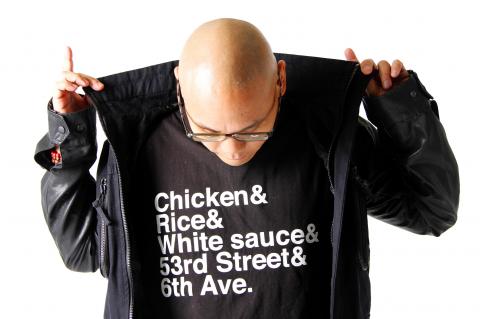You could say that DJ Neil Armstrong (real-name Neil Rodriguez) went to the moon, as far as deejaying goes. He spent two years touring with Jay Z and for a lot of hip-hop DJs, this career peak would be the final destination. But for him, it was just a stepping-stone on the journey into the future.
But in the meantime, it was the opportunity of a lifetime and planted him on stage with other artists like Beyonce, secured him an appearance on Letterman, and even a spot on the bill for US President Barack Obama’s 2009 inauguration party. It sounds far-fetched, the US president throwing a hip-hop party, but DJ Neil Armstrong says the connection is simple. Hip-hop has come a long way from when it first surfaced in the underbelly of America’s inner cities, today permeating people’s lives from fashion to the manner in which people speak about politics.
It was during that earlier time when hip-hop was just starting as a turntablist subculture that DJ Neil Armstrong started breathing music.

Photo courtesy of Jane Music Group
“Back in the day we just did routines and performance and the object was that I wanted everyone to stop and watch me. These days it’s not just about me, it’s about the crowd and the party,” he said.
Around the same time, he began creating mixtapes and the project ended up spawning an entire culture. While you can think of them as just another downloadable set of mashups, they are curated in a way that they actually take listeners back to a time where mixtapes were made as a reflection of life and given out for love. DJ Neil Armstrong spends anywhere from three weeks to two years researching music for his mixtapes so that it all goes together like a puzzle. It starts with a theme, he says, and then the rest just follows.
Having also spent a year as the global ambassador for Adidas, deejayed for the NBA, and played for hundreds of thousands of people at festivals like Glastonbury, he is impressively humble. DJ Neil Armstrong stays grounded by reminding himself that at the end of the day, he is just playing music.
“You have to keep it in perspective. There are people out there saving lives. There are people fighting in wars, and people shaping the global economy. I play a small part in making the world a better place, and I need to always be grateful for that,” he says.
And that’s why he has no qualms with stepping off the big stage and into the small clubs of Taipei. Whether it’s for 10,000 people or 50, DJ Neil Armstrong says that making people dance to good music is his job and both situations give him the same feeling of satisfaction.
He’s also looking forward to the food in Taipei, which he says he loves. In fact, whether at home or on tour, DJ Neil Armstrong is always snapping pictures of his food and even contributes to a food blog (pommedesgarcons.com).
■ DJ Neil Armstrong plays tomorrow at the final Oasis Pool Party, noon to 7pm at the Grand Hyatt Taipei, 2 Songshou Road, Taipei City (信義區松壽路2號). Tickets are available at the door only and are NT$300 for women and NT$500 for men before 1pm; NT$700 after. All admissions include a drink. For more information, call 0917-840-519. He later plays the official after party from 9pm to 3am at LMNT, 28 Songshou Rd, Taipei City (台北市信義區松壽路28號). Admission is free but there is one drink minimum.

April 14 to April 20 In March 1947, Sising Katadrepan urged the government to drop the “high mountain people” (高山族) designation for Indigenous Taiwanese and refer to them as “Taiwan people” (台灣族). He considered the term derogatory, arguing that it made them sound like animals. The Taiwan Provincial Government agreed to stop using the term, stating that Indigenous Taiwanese suffered all sorts of discrimination and oppression under the Japanese and were forced to live in the mountains as outsiders to society. Now, under the new regime, they would be seen as equals, thus they should be henceforth

Last week, the the National Immigration Agency (NIA) told the legislature that more than 10,000 naturalized Taiwanese citizens from the People’s Republic of China (PRC) risked having their citizenship revoked if they failed to provide proof that they had renounced their Chinese household registration within the next three months. Renunciation is required under the Act Governing Relations Between the People of the Taiwan Area and the Mainland Area (臺灣地區與大陸地區人民關係條例), as amended in 2004, though it was only a legal requirement after 2000. Prior to that, it had been only an administrative requirement since the Nationality Act (國籍法) was established in

With over 80 works on display, this is Louise Bourgeois’ first solo show in Taiwan. Visitors are invited to traverse her world of love and hate, vengeance and acceptance, trauma and reconciliation. Dominating the entrance, the nine-foot-tall Crouching Spider (2003) greets visitors. The creature looms behind the glass facade, symbolic protector and gatekeeper to the intimate journey ahead. Bourgeois, best known for her giant spider sculptures, is one of the most influential artist of the twentieth century. Blending vulnerability and defiance through themes of sexuality, trauma and identity, her work reshaped the landscape of contemporary art with fearless honesty. “People are influenced by

Three big changes have transformed the landscape of Taiwan’s local patronage factions: Increasing Democratic Progressive Party (DPP) involvement, rising new factions and the Chinese Nationalist Party’s (KMT) significantly weakened control. GREEN FACTIONS It is said that “south of the Zhuoshui River (濁水溪), there is no blue-green divide,” meaning that from Yunlin County south there is no difference between KMT and DPP politicians. This is not always true, but there is more than a grain of truth to it. Traditionally, DPP factions are viewed as national entities, with their primary function to secure plum positions in the party and government. This is not unusual